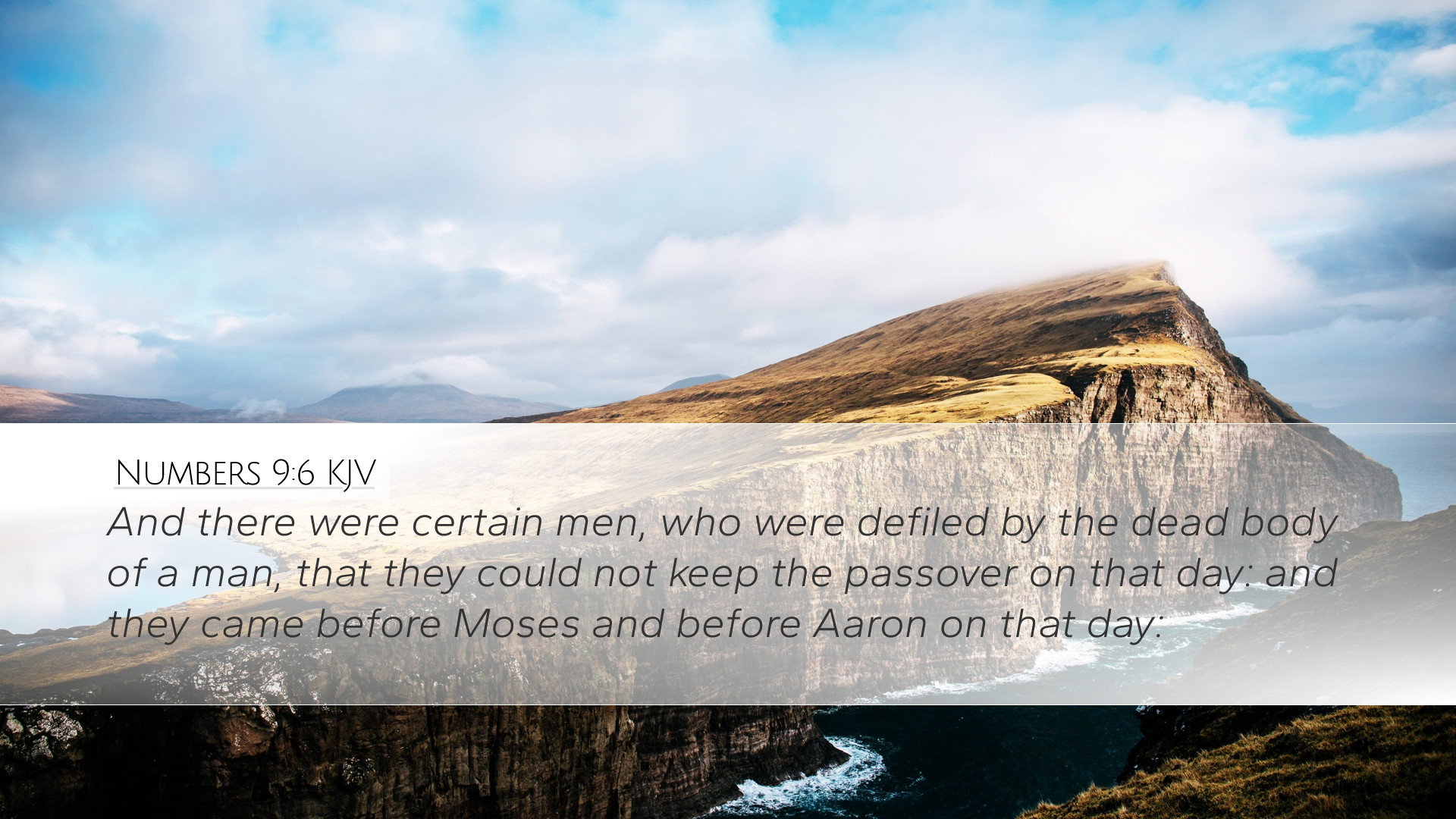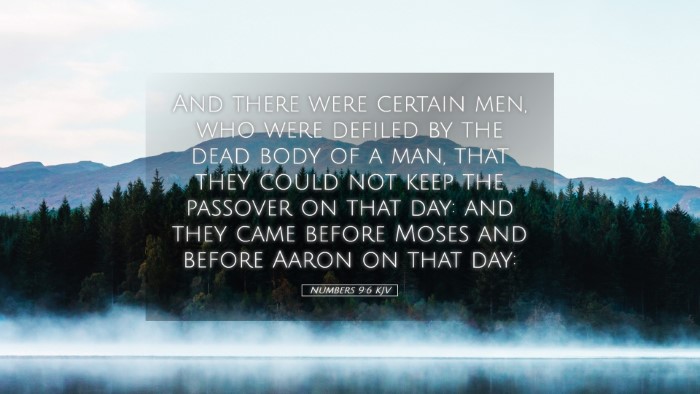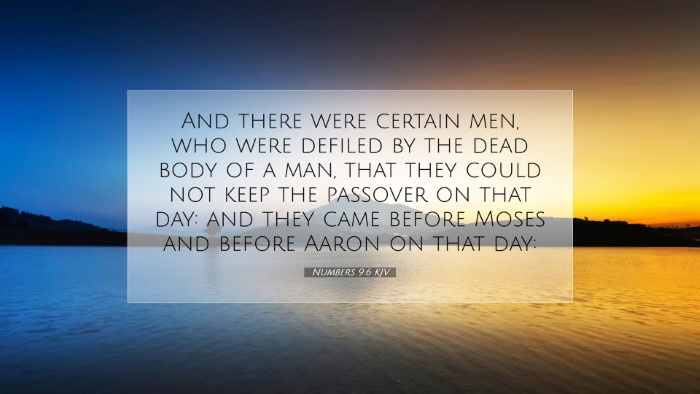Commentary on Numbers 9:6
Verse Context: Numbers 9:6 states: “And there were certain men, who were defiled by the dead body of a man, that they could not keep the passover on that day: and they came before Moses and Aaron on that day.” This verse occurs in the context of the Israelites as they journey through the wilderness, where the observance of the Passover is reaffirmed.
Exposition of the Verse
In this passage, we see the encounter of certain men who, due to ceremonial defilement, were unable to partake in the solemn observance of the Passover. The mention of their condition highlights the significant emphasis placed on purity and adherence to God's laws, particularly regarding the sacred rites of the community.
Insights from Public Domain Commentaries
Matthew Henry's Commentary
Ceremonial Defilement: Matthew Henry highlights the importance of ceremonial cleanliness required for participation in the Passover. He notes that those who were defiled by contact with a dead body were legally barred from keeping the feast until they were cleansed. This affirms the holiness of the ordinance and the relevance of purity in worship.
Human Concern: Furthermore, Henry emphasizes the fact that these men did not remain silent regarding their situation. They approached Moses and Aaron, reflecting a commendable sense of responsibility and desire to fulfill their religious obligations despite their unfortunate circumstances. This act of approaching spiritual leaders underscores a key principle in faith—that believers are encouraged to seek out guidance when faced with dilemmas.
Albert Barnes' Notes
Legal Considerations: Albert Barnes elaborates on the legal structures in place concerning the observances of religious feasts. He points out that the Mosaic Law, which is elaborated upon in Leviticus, provided clear stipulations regarding what constituted defilement. Barnes notes, however, that the defilement in question was not moral but ritual, showcasing the distinctive nature of law versus grace in God’s covenant.
Compassion of God: Moreover, Barnes reflects on the compassionate nature of God as demonstrated through this passage. The very fact these men sought to participate—despite their condition—demonstrates a yearning to be in communion with God, echoing the sentiments found in the later passages that facilitate atonement and forgiveness for those unable to fulfill religious rites.
Adam Clarke's Commentary
Historical and Cultural Context: Adam Clarke provides historical insight into the practice of Passover as it was tied closely to the agrarian society of ancient Israel. He comments that the Passover served as a community bonding experience, essential for communal integrity and cohesion amongst the Israelites, emphasizing why those who could not partake sought an alternative way to participate.
Requests for Provision: Clarke also notes the implications of these men's actions in seeking a solution. Their request to Moses and Aaron is a precursor to God’s gracious adjustments of the law which later permits a second observance of Passover. This aligns with God’s justice and mercy, showing that while He is bound by His law, He is also willing to meet His people at their point of need.
Theological Implications
This commentary on Numbers 9:6 brings to light several theological implications crucial for pastors, scholars, and theology students alike:
- The Nature of Defilement: Understanding the concept of defilement is essential in biblical theology. It serves as a metaphor for sin and separation from God, emphasizing the need for cleansing and reconciliation.
- God’s Law and Grace: The balance of law and grace is exemplified; while God's law is perfect and just, grace provides a means of redemption and inclusion even for those who seem to be excluded.
- Community and Worship: The community aspect of worship illustrated in the observance of Passover showcases the corporate nature of faith. All members are invited to participate, and provisions are made for the needs of those who, through no fault of their own, find themselves unable to partake fully.
- This Calls for Seeking Answers: The action of the men to approach Moses highlights an essential aspect of the Christian journey—a continual seeking of understanding and a desire to be included in God’s covenant community.
Practical Application
For pastors and church leaders, Numbers 9:6 serves as a reminder to cultivate an environment of inclusivity and understanding towards those who might feel marginalized. Spiritual leaders should be attuned to the needs of their congregations and be ready to provide pastoral care and alternative options for participation in church life.
Moreover, for individual believers, this passage prompts introspection regarding one's own barriers to communion with God. It urges the faithful to seek connection, despite personal failings or circumstances, encouraging a persistent pursuit of God’s grace and involvement in spiritual practices.
Conclusion
Numbers 9:6 resonates profoundly within the broader tapestry of biblical worship, law, and grace. As saints reflect on the urgency of maintaining community and the necessity of observing God’s laws, they are invited into deeper theological engagement and compassionate practice in their ministries. This verse teaches precious principles about the nature of God, the importance of ritual, and the heart of humanity in seeking divine fellowship.


